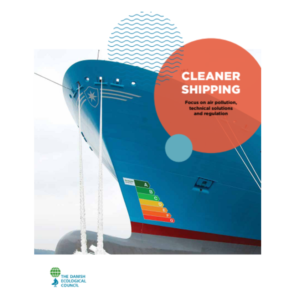 NOTE: AN UPDATED VERSION OF THIS REPORT IS NOW AVAILABLE HERE
NOTE: AN UPDATED VERSION OF THIS REPORT IS NOW AVAILABLE HERE
Download: Cleaner Shipping – Focus on air pollution, technical solutions and regulation SEE UPDATED VERSION HERE
A Report by the Danish Ecological Council
This publication focuses on air pollution with CO₂, SO₂, NOx and fine/ultrafine particles from shipping, technical solutions, existing regulation, the need for further regulation and enforcement. The purpose is to inspire decision-makers and other key stakeholders to implement more ambitious regulation as well as enforcement to reduce air pollution from shipping to the benefit of shipping as a business, the climate, public health and nature.
Introduction: Air Pollution from Shipping: About 90% of global cargo is transported by ships; shipping is thereby the key platform of the still increasing global trade. However, the high transport share leads to around 6 million barrels of oil being combusted in ship engines every day – corresponding to the oil export of Kuwait – thereby contributing with 2-2.5% of global anthropogenic CO2 emissions.
Most ships use heavy fuel oil (HFO) that can contain up to 3.5% sulphur. However, in the specific SECAs (Sulphur Emission Control Areas), including seas around Denmark, a maximum of 0.1% sulphur is allowed, so lighter fuels are used. For comparison, road diesel in the EU can only contain 0.001% sulphur. Consequently, fuel used by ships in the Baltic Sea can contain 100 times more sulphur than cars crossing the bridge between Denmark and Sweden.
Ideal combustion in ship engines oxidises all carbon and sulphur into CO2 and sulphur oxides (mainly sulphur dioxide, SO₂). At the same time, free nitrogen (N₂) in the combustion air is oxidised into nitrogen oxides (NOX) inside the engine. However, complete combustion does not occur. Hence, the flue gas contains carbon monoxide, polycyclic aromatic hydrocarbons, volatile organic compounds and particulate matter. High sulphur contents in the fuel oil increase emissions of SO₂ and particulate matter. The most important pollutants in relation to health damage are SO₂, NOX and fine particles (PM2.5), as these pollutants have a long lifetime and thereAIR POLLUTION FROM SHIPPING by significantly increase air pollution on land. However, ultrafine particles (PM0.1) from ships in ports can cause work related heath problems for port workers and significant local pollution. This is especially the case, when cruise ships use their engines for energy generation during long port calls.
The use of fuel oil thereby emits the same air pollutants as traditionally emitted by road vehicles, power plants, etc. However, most road fuel is de-sulphurised today, and vehicles and power plants have efficient flue gas cleaning systems in most of the world. No comparable regulations apply to shipping. However, in recent years the IMO (International Maritime Organization) has adopted regulation that will reduce emissions from shipping.
Download: Cleaner Shipping – Focus on air pollution, technical solutions and regulation SEE UPDATED VERSION HERE

